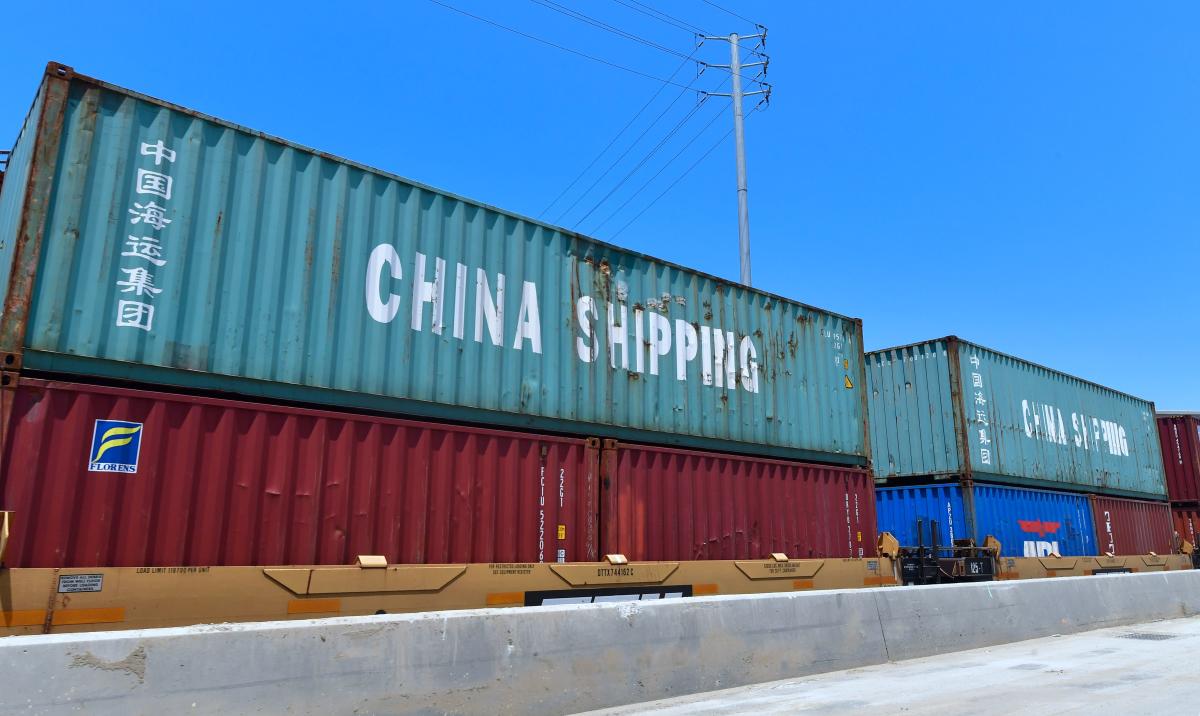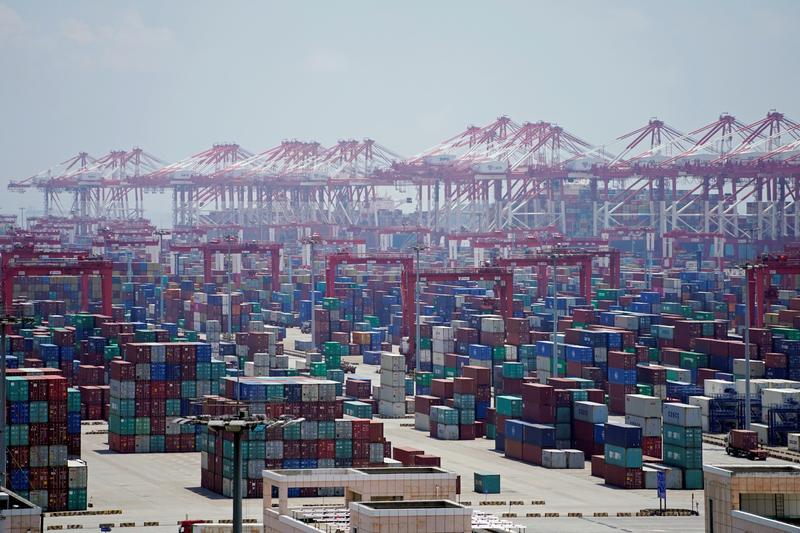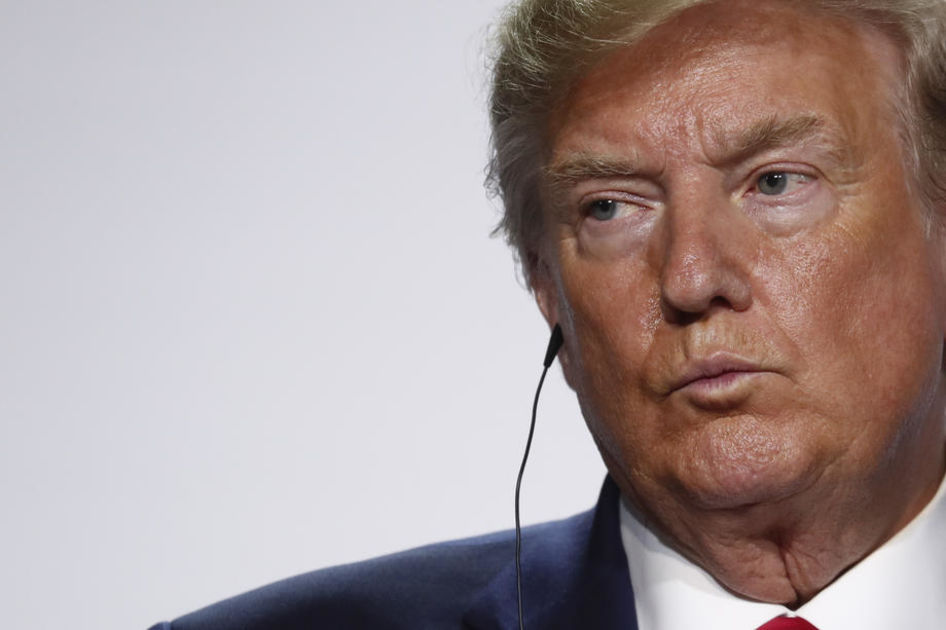Jos osuus reservivaluutasta luokkaa 60% (Dollari) ja lähin seuraava luokkaa 20% (Euro), niin mihin pohjaa väite "Nyt kun dollarin käyttö reservivaluuttana loppuu"?Entäpä jos trump on syntipukki? Nyt kun dollarin käyttö reservivaluuttana loppuu ja maat ajetaan lamaan, niin trumpiahan siitä syytetään. Ja pankkiirit nauraa taas takana.
Install the app
How to install the app on iOS
Follow along with the video below to see how to install our site as a web app on your home screen.
Note: This feature may not be available in some browsers.
You are using an out of date browser. It may not display this or other websites correctly.
You should upgrade or use an alternative browser.
You should upgrade or use an alternative browser.
Trump -psykoosi
- Viestiketjun aloittaja ak.tied
- Aloitus PVM
Bushmaster
Greatest Leader
No nii...Kiinalta loppui sitten paukut vastata Trumpin toimiin....

 www.bnnbloomberg.ca
www.bnnbloomberg.ca

 finance.yahoo.com
finance.yahoo.com

 finance.yahoo.com
finance.yahoo.com

BNN Bloomberg - Canada Business News, TSX Today, Oil and Energy Prices
Get the latest Canadian business news, including TSX updates, changes to oil and energy prices, and Bank of Canada coverage. Explore stock market investing and get expert financial insights on investment portfolio strategies.
Stock market news: August 29, 2019
Domestic stock futures climbed Thursday morning after the latest update in the shifting U.S.-China trade war narrative suggested Beijing would not retaliate against the Trump administration’s most recent set of tariff increases.
China hints it won’t retaliate against newest U.S. tariffs: Morning Brief
Top news and what to watch in the markets on Thursday, August 29, 2019.
Bushmaster
Greatest Leader
Kiina pyytää jo apua... Mahtaa ny tämän laudan Trump hatersseja vi*uttaa 


 www.reuters.com
www.reuters.com


Signs of new U.S.-China trade discussions emerge as increased tariffs loom
The United States and China gave signs on Thursday that they will resume trade talks as the two economic superpowers discussed the next round of in-person negotiations in September ahead of a looming deadline for additional U.S. tariffs.
taantumu
Ylipäällikkö
Trumpin hallinto aikoo löysätä energiateollisuuden metaanipäästöjä koskevia asetuksia vaikka mm. Exxon, Shell ja BP vastustavat päästörajojen löysäämistä. Syynä asetusten löysäämiselle on ilmeisesti se että Obama kiristi niitä.
https://www.washingtonpost.com/clim...verse-limits-methane-powerful-greenhouse-gas/The Environmental Protection Agency is set to announce Thursday that it will loosen federal rules on methane, a powerful greenhouse gas linked to climate change, according to two senior administration officials.
The proposed rule will reverse standards enacted under former president Barack Obama that require oil and gas operations to install controls on their operations to curb the release of methane at the well head and in their transmission equipment, including pipelines, processing and storage facilities.
A senior administration official, speaking on the condition of anonymity because the announcement was not yet public, said Trump officials were confident the oil and gas industry had an economic incentive to limit methane because capturing it allows companies to sell more gas. The agency estimates that the proposed changes, which will be subject to public comment for 60 days after it is published, would save the oil and natural gas industry between $17 million and $19 million a year.
But several of the world’s biggest fossil fuel companies, including Exxon, Shell and BP, have opposed the rollback and urged the Trump administration to keep the current standards in place. Collectively, these firms account for 11 percent of America’s natural gas output.
In a statement Thursday, Shell U.S. President Gretchen Watkins reiterated the company’s support for national limits on methane, noting that Shell has pledged to reduce its methane leaks from its global operations to less than 0.2 percent by 2025.
“We believe sound environmental policies are foundational to the vital role natural gas can play in the energy transition and have made clear our support of 2016 law to regulate methane from new and modified onshore sources,” she said. “Despite the administration’s proposal to no longer regulate methane, Shell’s U.S. assets will continue to contribute to that global target.”
The Wall Street Journal first reported news of the rollback.
Methane is a significant contributor to the world’s greenhouse gas emissions, though it is shorter lived than carbon dioxide and is not emitted in as large amounts. It is 80 times more powerful than CO2 and often leaked as companies drill for gas and transport it across the country.
Scientists have projected that the world needs to cut its overall greenhouse gas emissions nearly in half by mid-century in order to avert dangerous impacts from global warming.
According to an EPA document obtained by The Post, the agency will continue regulating volatile organic compounds, which are also released during oil and gas operations, rather than methane directly. Such limits could cut down on the amount of methane released in the process.
Last September, the Interior Department eased requirements that oil and gas firms operating on federal and tribal land capture the release of methane.
Environmentalists threatened to fight the Trump administration’s move in court.
“This reckless rollback highlights the Trump administration’s complete contempt for our climate,” said Kassie Siegel, director of the Climate Law Institute at the Center for Biological Diversity, an advocacy group. “The EPA is now so determined to actually increase greenhouse pollution that it’s even shrugging off concerns from oil and gas companies about gutting these protections. Fracked gas is a climate killer, and Trump’s rash embrace of this dirty stuff showcases the need for the next president to commit to a rapid phase-out of fossil fuels.”
The Obama administration’s push to impose the first-ever limits on methane emissions from the oil and gas industry in 2016 came shortly after the EPA found that emissions were on an upswing at a time when booming U.S. shale oil and gas drilling had dramatically driven down prices for domestic natural gas and global oil alike.
Ben Ratner, a senior director at the advocacy group Environmental Defense Fund, said in an interview that rolling back the regulations could reward bad actors in the industry. Given the fact that many major players had embraced limits on methane, Ratner said, it made little sense for Trump officials to ease such restrictions.
“It’s more of an ideological reaction to regulation of any climate pollutant by the federal government,” he said.
Trumpin hallinto aikoo löysätä energiateollisuuden metaanipäästöjä koskevia asetuksia vaikka mm. Exxon, Shell ja BP vastustavat päästörajojen löysäämistä. Syynä asetusten löysäämiselle on ilmeisesti se että Obama kiristi niitä.
https://www.washingtonpost.com/clim...verse-limits-methane-powerful-greenhouse-gas/
En tiedä, mutta spekuloin. Voi olla että ko. Yhtiöt ovat jo kireämpien päästörajojen sisällä tuotantorakenteensa, investointien tai vaikka vilungin ansiosta, mutta osa kilpailijoista/toimialasta ei ole. Näin katsovat, että heille tiukemmat rajat on kilpailuetu ja tietysti ilmastoon vedoten vastustavat helpotuksia vaikka todellinen motiivi on parempi kannattavuus/hinnoitteluvoima eli $$$.
Trumpin hallinnon pelätään vetävän pois Yhdysvaltojen sotilaallisen tuen Ukrainalta

 yle.fi
yle.fi

Trumpin hallinnon pelätään vetävän pois Yhdysvaltojen sotilaallisen tuen Ukrainalta
Politico-lehden lähteen mukaan Trump olisi puhunut turvallisuusneuvonantajilleen satojen miljoonien tuen syynäämisestä.

Trumpin entinen puolustusministeri Mattis avautui eronsa syistä: Yhdysvallat ei kunnioita enää liittolaisiaan ja lietsoo eripuraa
Merijalkaväen kenraali arvosteli suorasanaisesti Donald Trumpin hallinnon politiikkaa.
Viimeksi muokattu:
Mili
Eversti
Kaikkeen on aina kaksi syytä: sopiva syy ja oikea syy.En tiedä, mutta spekuloin. Voi olla että ko. Yhtiöt ovat jo kireämpien päästörajojen sisällä tuotantorakenteensa, investointien tai vaikka vilungin ansiosta, mutta osa kilpailijoista/toimialasta ei ole. Näin katsovat, että heille tiukemmat rajat on kilpailuetu ja tietysti ilmastoon vedoten vastustavat helpotuksia vaikka todellinen motiivi on parempi kannattavuus/hinnoitteluvoima eli $$$.
Kyllä Trumpin kolhdalla. Ero 100-0 Euroopan presidenttien hyväksi.Niin kyllä euroopan johtajia trumpin pitäisi pokkuroida ,on ne niin eri luokkaa kuin yhdysvaltain presidentti.
Jos Trumpin alamäki jatkuu, niin tällaista on ennustettavissa lisää.
Nyt myös FOX on pettänyt hänet.
Nyt myös FOX on pettänyt hänet.
Lisäksi Trump lupasi armahtaa virkamiehet, jotka rikkovat lakia, jos tekevät, mitä hän pyytää.
tulikomento
Supreme Leader
Entinen puolustusministeri Jim Mattis avautuu. Korostaa liittolaissuhteiden tärkeää merkitystä Yhdysvaltojen omalle turvallisuudelle. Varsinainen vihervassarisuvakkibolsevikki tämä kenraali evp.

 www.hs.fi
www.hs.fi
Eläkkeelle jäänyt merijalkaväen kenraali paljasti irtisanoutuneensa, koska hänen ”konkreettiset ratkaisunsa ja strategiset neuvonsa” – erityisesti liittyen luottamuksen ylläpitämiseen liittolaisten kanssa – ”eivät enää saaneet vastakaikua” Yhdysvaltain ylimmässä johdossa.
”Sotilaana en ole eniten huolissani ulkoisista vihollisistamme vaan sisäisestä jakautumisestamme”, Mattis kirjoitti.
”Ennen olimme yhtenäisiä ja luotimme liittolaisiimme, nykyään näytämme vain repivän hajalle.”

Trumpin entinen puolustusministeri Mattis avautui eronsa syistä: Yhdysvallat ei kunnioita enää liittolaisiaan ja lietsoo eripuraa
Merijalkaväen kenraali arvosteli suorasanaisesti Donald Trumpin hallinnon politiikkaa.
Eläkkeelle jäänyt merijalkaväen kenraali paljasti irtisanoutuneensa, koska hänen ”konkreettiset ratkaisunsa ja strategiset neuvonsa” – erityisesti liittyen luottamuksen ylläpitämiseen liittolaisten kanssa – ”eivät enää saaneet vastakaikua” Yhdysvaltain ylimmässä johdossa.
”Sotilaana en ole eniten huolissani ulkoisista vihollisistamme vaan sisäisestä jakautumisestamme”, Mattis kirjoitti.
”Ennen olimme yhtenäisiä ja luotimme liittolaisiimme, nykyään näytämme vain repivän hajalle.”
Entinen puolustusministeri Jim Mattis avautuu. Korostaa liittolaissuhteiden tärkeää merkitystä Yhdysvaltojen omalle turvallisuudelle. Varsinainen vihervassarisuvakkibolsevikki tämä kenraali evp.

Trumpin entinen puolustusministeri Mattis avautui eronsa syistä: Yhdysvallat ei kunnioita enää liittolaisiaan ja lietsoo eripuraa
Merijalkaväen kenraali arvosteli suorasanaisesti Donald Trumpin hallinnon politiikkaa.www.hs.fi
Eläkkeelle jäänyt merijalkaväen kenraali paljasti irtisanoutuneensa, koska hänen ”konkreettiset ratkaisunsa ja strategiset neuvonsa” – erityisesti liittyen luottamuksen ylläpitämiseen liittolaisten kanssa – ”eivät enää saaneet vastakaikua” Yhdysvaltain ylimmässä johdossa.
”Sotilaana en ole eniten huolissani ulkoisista vihollisistamme vaan sisäisestä jakautumisestamme”, Mattis kirjoitti.
”Ennen olimme yhtenäisiä ja luotimme liittolaisiimme, nykyään näytämme vain repivän hajalle.”
Bolsevikit ovat levittäytyneet kaikkialle.
Miten ihmisen tunnistaa bolsevikiksi?? Tässä oma listani: Bolsevikki ei omista MAGA lippistä, Trumpin kuvaa ei löydy seinältä, kyseenalaistaa yhdenkin Trumpin twiitin, ei seuraa Trumpia twitterissä, väittää Hillaryn saaneen enemmän ääniä kuin Trumpin, uskoo horinoita laman mahdollisuudesta vaikka presidentti Trump on sanonut ettei sellaista tule, jos lama tulee syyttää siitä Trumppia (oikeat syylliset Obama sekä globalistit).
Bushmaster
Greatest Leader
Mutta kukaan Obama- fantsuista ei muista kertoa miten "kenialainen" armahti wikipedia vuotaja transu- manningin? 

lukkarinapulainen
Majuri
Uhriutumisella pääsee vain niin (näytän koukistettua pikkusormea) pitkälle.Miten ihmisen tunnistaa bolsevikiksi?? Tässä oma listani: Bolsevikki ei omista MAGA lippistä, Trumpin kuvaa ei löydy seinältä, kyseenalaistaa yhdenkin Trumpin twiitin, ei seuraa Trumpia twitterissä, väittää Hillaryn saaneen enemmän ääniä kuin Trumpin, uskoo horinoita laman mahdollisuudesta vaikka presidentti Trump on sanonut ettei sellaista tule, jos lama tulee syyttää siitä Trumppia (oikeat syylliset Obama sekä globalistit).
Vetääkö fox kuivana trumppia.

